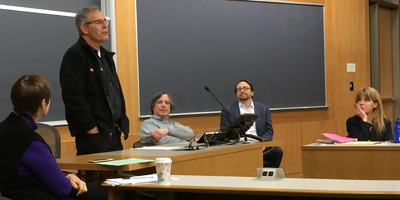Immigration, the Environment, Executive Actions, and the Limitations of the Executive Branch
BU Law faculty share insights into the first week of Donald Trump’s presidency.

The Boston University School of Law community gathered last week to explore the legal foundations of the policies enacted in the first week of Donald Trump’s presidency. “The transition from President Barack Obama to President Donald Trump has created a lot of concerns among our community, many of which are around law and policy,” said Associate Dean for Experiential Education Peggy Maisel, who moderated the conversation.
Four professors of law with expertise in areas including immigration law, environmental law, constitutional law, and administrative law discussed questions raised by students in the first of a series of events aimed at helping these future lawyers understand the political process and the extent of power granted to each branch of government. Although the faculty covered as much ground as they could in their allotted time, many questions remained unanswered, leaving room for the School to continue hosting such events. “I see this as the beginning of the conversation,” Associate Dean Maisel said.
In response to the President’s statements that the exchange of goods and services at fair market value does not violate the emoluments clause of the Constitution, Professor Jay Wexler argued the real problem is that foreign governments may choose a Trump product or service in order to curry favor with the President, an act that may be interpreted as a gift and so present serious conflicts of interest whether or not the fair market value was paid.
Providing context around the executive orders relating to immigration that were signed last week, Clinical Associate Professor Karen Pita Loor focused on the President’s power as it relates to immigration law, the obstacles in place to prevent the expansion of the wall bordering Mexico and the US, and the proposed funding cuts to sanctuary cities. Regarding the suspension of Visa issuance and refugee resettlement programs from seven majority Muslim countries, Pita Loor noted the President’s wide range of control over the regulation of noncitizens entering the US. “Part of the issue with Trump’s policies concern legality and constitutionality,” she said, “but the other part is about good policy.”
Professor Jack Beermann compared the transition of power and the first week of the Trump administration with the 1980 election, in which Ronald Reagan came to power promising similar upheaval. “In truth,” Beermann said, “he deregulated less then President Carter and raised taxes, so you don’t know what you’re going to get based on what a candidate campaigns on.” Touching on the reach of executive orders, he noted that the court has the authority to strike down any order that puts legal obligations on people or agencies outside of the executive branch. In terms of allocating funding, however, the President does have broad discretion to spend money in the way he chooses, although, Congress can push back on this.
As a counter-balance to the conversation, Philip S. Beck Professor Gary Lawson, who describes himself as a constitutional originalist, focused on the potential to rein in the power of the executive branch. “Congress is supposed to pass laws that operate as laws rather than designating people or agencies to do things,” he said. To accomplish this, all three branches have to work together. He asserted that conflict between political parties and obstruction in Congress has led presidential elections to become much more important than originally intended, since the only way to enact change is through executive order. “There are many people involved in the legal side of the Trump administration who have the same concerns. We’re looking at now a rare alignment of forces that are willing to curtail the power of the executive.”
